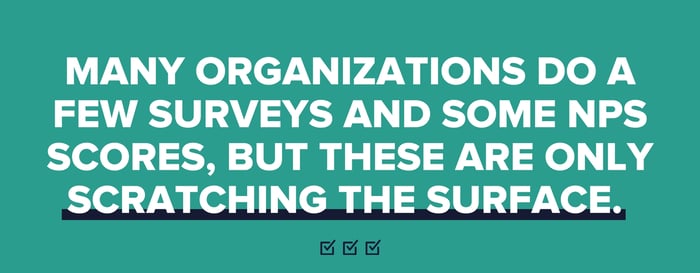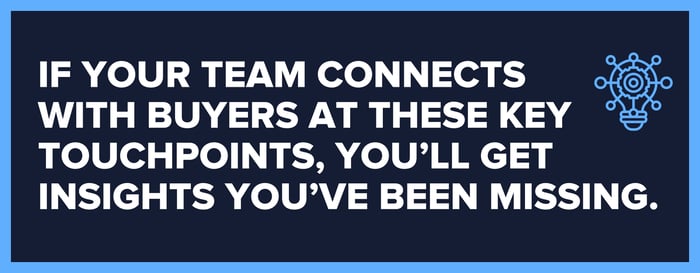The greatest source of information about how your company’s performing is your customers.
I know that sounds obvious, but I think thousands of companies are underutilizing the value their customers can bring to their marketing and sales.

Many organizations do a few surveys and some net promoter scores (NPS), but these are only scratching the surface.
A lot of people are very cautious about bothering their customers — burdening them with requests and making them feel alienated.
And I get that – but if you approach your customers the right way, you’ll actually build a stronger bond, all while learning valuable insights to improve your sales and marketing.
Below, I’ll explain exactly what I would ask of my customers about our sales and marketing — and when I would ask it.
You can use my formula to glean as much information from them as possible. Which, in turn, will help you fine-tune your messaging and your sales process.
Let’s jump in.
The two often-ignored customer touchpoints
Every step of the customer journey is a learning opportunity, but, in my experience, two key points get overlooked, which can provide high value to your team.
If you can have your team connect with buyers at these key touchpoints, you’ll get insights you’ve been missing.
For marketers
Talk to customers right after they close.
It’s easy for marketers to stop paying attention to leads after they get passed onto the sales team, but this is a unique missed opportunity for feedback.
A newly-signed customer is the culmination of the efforts of both sales and marketing. They will have fresh insights into your messaging and outreach that may get forgotten down the line.

For salespeople
Talk to customers right after the service has been performed or the product has been delivered.
It’s easy for salespeople to stop paying attention after a deal is closed, but this is a missed opportunity too. A closed customer can help you audit your sales process and service experience with their perspective.
These are the touchpoints where the customer will be able to give you the most feedback on your performance.
Here’s exactly what you should ask those customers.
What marketing should ask just-closed customers
A customer who has just closed is at the very end of your entire marketing and sales process.
Why is this important? Whatever you did worked — Congratulations! However the lead came to you, whatever they bought, they are proof that your process was effective. Now, you want to attract more people just like them.
So, what should you ask? Here’s a run-down.
When to ask: Right after the deal closes.
How to ask: A 15-minute 1-1 meeting (as opposed to a survey or focus group)
What to ask:
- What were the specific worries or fears that you had when you were considering the purchase of this product or service?
- What did you see as the biggest risks?
- When was the moment that you knew you needed to buy?
- When you first came to our website, was it clear what problem we solve?
- When did you know you wanted to go with our company?
- What were the things you heard (or did not hear) from other companies that made you not choose them?
- When you were researching our company, was there any information you wanted but couldn’t find?
- Were you able to find out everything you wanted to know about cost and price before talking to our sales team?
- What parts of our website were most valuable to you?
- When you received communication from our company, did you find it annoying or valuable?
- Were there any steps of the sales process that felt like they moved too slowly or too quickly?
The point of this conversation will be to have new customers reflect on what brought them to you and got them into your funnel. At this point, the whole customer journey is fresh in their mind, so they’ll likely be able to give you more detailed answers.
Make sure to record these meetings so you don’t lose access to the insights.
Keep in mind, you don’t need to interview every customer. For some businesses, that’s not at all reasonable. But if you sell bigger ticket items, you might only sell to a handful of buyers each quarter, so every individual purchase is a big deal for your company.
No matter what you offer or how many you sell, plan on having a few of these interviews every month. That way, you’ll have enough information to draw meaningful conclusions.
What salespeople should ask customers after the service or delivery is complete
I know, salespeople already know so much about their buyers. But after the sale, they hand over the customer to the services team, or the customer gets the product, and that’s usually it. Sales reps turn their attention to their next prospects.
But sales conversations are full of promises — and sales reps should check in to make sure their promises were kept when the product was delivered or the service was rendered.
If we create an additional touchpoint, the sales team can use the relationship and trust they’ve established with a customer to get candid feedback and learn a whole more — and then apply it to future sales conversations.
When: Shortly after the product has been delivered or the service has been rendered.
How: A short survey (sent with a personal note)
What they should ask:
- What was your initial impression of me as a salesperson?
- Did I match the identity of the brand you’d gotten from our website?
- Did you at any point lack confidence in the things that I was telling you?
- If you were forced to give me specific feedback on how I could get better as a sales professional, what would you say?
- What's one thing that you really wish I would've said in the sales process that I didn't say?
- Was there any part of the sales process that was a waste of time for you?
- Did the sales process move too slowly or too quickly?
- Was there anything we could have done to make you say yes more quickly?
- What made you say no to the other businesses you were considering?
After the customer has completed the purchase, they’re in a great position to evaluate the whole customer experience.
Now, you might not want to survey them the very day their new product gets delivered; they might need a couple weeks. But you don’t wait too long. You want the experience to be fresh in their mind.
Prompt them to be honest. Use words that encourage them to give real feedback. You don’t want to just hear them say everything was “fine.”
Learn from (but don’t pester) your customers
I hear from too many businesses that give lip service to customer research but don’t actually get all that much out of it. They have NPS as a core vital they’re tracking, and they think that’s sufficient.
It’s not.
Use these touchpoints to get honest feedback on your sales and marketing processes so you can better serve your future customers.
.jpg?width=700&height=2198&name=Learning-From-Customer-Touchpoints%20(1).jpg)
And if you want to learn more about optimizing your sales and marketing, join IMPACT’s Zach Basner and Nick Bennett every week for a free session focusing on a current issue we see our clients facing.
* This article was originally published here
No comments:
Post a Comment